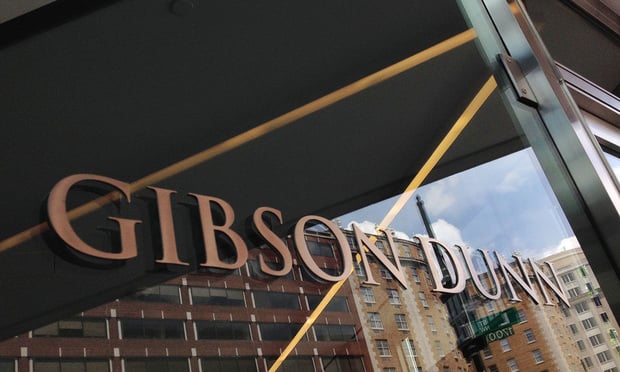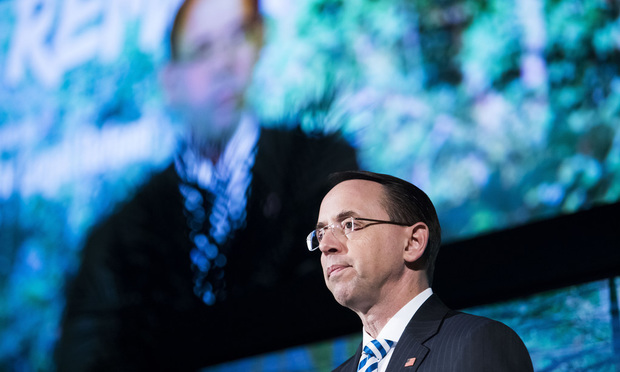Gibson Dunn Team Sues Justice Department Over Reversal on Online Gambling
“The text, structure, and history of the Wire Act make clear that its prohibitions extend only to gambling on sporting events,” according to the complaint, filed in New Hampshire federal district court.
February 16, 2019 at 11:21 AM
4 minute read
 Gibson, Dunn & Crutcher offices in Washington, D.C. (Photo: Diego M. Radzinschi/ ALM)
Gibson, Dunn & Crutcher offices in Washington, D.C. (Photo: Diego M. Radzinschi/ ALM)
The U.S. Justice Department's abandoning of a 2011 opinion that had permitted certain forms of internet gambling drew a legal challenge Friday from an online lottery company, which said the government's abrupt reversal was “deeply flawed” and the product of a lobbying campaign by a prominent Las Vegas casino magnate.
The company, NeoPollard Interactive LLC, represented by the law firm Gibson, Dunn & Crutcher, filed the lawsuit in U.S. District Court for the District of New Hampshire. The New Hampshire Lottery Commission, represented by the state attorney general's office, filed a related challenge against the Justice Department. NeoPollard serves as the technology and service provider of the New Hampshire state iLottery system.
The lawsuits put a spotlight on a recent—and rare—decision by the Justice Department's legal counsel office to reverse an earlier memo that said the federal Wire Act only made online sports betting unlawful, not online lotteries.
A Wall Street Journal report in January said the change of position tracked a legal memo offered by lawyers for Sheldon Adelson, the Las Vegas casino titan. The Justice Department in the report denied there was any undue outside pressure compelling the legal counsel's office to reverse its position in the earlier memo, which was published in 2011.
The day after the new legal opinion's public release, on Jan. 15, Deputy Attorney General Rod Rosenstein issued a memo saying the Justice Department would wait 90 days before enforcing the broader interpretation of the Wire Act to give businesses that relied on the 2011 opinion “time to bring their operations into compliance with federal law.”
The Gibson Dunn team—including partner Matthew McGill and former U.S. solicitor general Theodore Olson, a leading appellate lawyer at the firm—asked a New Hampshire federal judge to reject the DOJ's new interpretation and declare that the Wire Act applies only to sports gambling. The lawsuit named newly confirmed Attorney General William Barr as a defendant.
 Rod Rosenstein, deputy attorney general (Photo: Diego M. Radzinschi/ ALM)
Rod Rosenstein, deputy attorney general (Photo: Diego M. Radzinschi/ ALM)“The text, structure, and history of the Wire Act make clear that its prohibitions extend only to gambling on sporting events,” the Gibson Dunn lawyers wrote in the complaint. The firm is working with Michael Delaney of the Manchester, New Hampshire, firm McLane Middleton.
The lawsuits contend that the Justice Department's move has thrown into question the legality of online lottery ticket sales in several states, including Michigan and New Hampshire, where it provides internet gambling technology. Those states, along with several others, began offering online gambling products after the Justice Department determined in 2011 that the Wire Act, a federal law that had lone been used to target online gambling, applied only to sports betting.
The New Hampshire attorney general's office noted that two federal appeals courts—the U.S. Court of Appeals for the First Circuit, which covers New Hampshire, and the U.S. Court of Appeals for the Fifth Circuit—have both held that the Wire Act applies strictly to sports betting, not online lotteries.
“As a result of the OLC's erroneous change in position, gaming activities long thought to be lawful are now under threat of imminent criminal and civil prosecution,” NeoPollard's lawyers wrote in the complaint. “This includes not only making lottery products available to consumers for purchase via personal computers and mobile devices, but also traditional lottery sales via brick-and-mortar retail sales agents.”
For Olson, who headed the OLC under the Reagan administration, Friday's lawsuit marked his latest argument in support of online gambling. Olson was a leading attorney supporting New Jersey's effort to legalize sports betting, in a case that led the Supreme Court last year to strike down a 1992 law that effectively banned commercial sports gambling in most states.
Read more:
Thomas Hungar, Formerly House General Counsel, Returns to Gibson Dunn
Gibson Dunn Ends Saudi Arabia Lobbying Contract
Trump State Department Is Sued Over Retooled Human Rights Report
This content has been archived. It is available through our partners, LexisNexis® and Bloomberg Law.
To view this content, please continue to their sites.
Not a Lexis Subscriber?
Subscribe Now
Not a Bloomberg Law Subscriber?
Subscribe Now
NOT FOR REPRINT
© 2025 ALM Global, LLC, All Rights Reserved. Request academic re-use from www.copyright.com. All other uses, submit a request to [email protected]. For more information visit Asset & Logo Licensing.
You Might Like
View All
'Serious Legal Errors'?: Rival League May Appeal Following Dismissal of Soccer Antitrust Case
6 minute read

SEC Puts Beat Down on Ex-Wrestling CEO Vince McMahon for Not Reporting Settlements
3 minute read
'The Tobacco Industry of This Decade': Slew of Class Actions Accuse DraftKings of Creating Addicts
5 minute readTrending Stories
Who Got The Work
J. Brugh Lower of Gibbons has entered an appearance for industrial equipment supplier Devco Corporation in a pending trademark infringement lawsuit. The suit, accusing the defendant of selling knock-off Graco products, was filed Dec. 18 in New Jersey District Court by Rivkin Radler on behalf of Graco Inc. and Graco Minnesota. The case, assigned to U.S. District Judge Zahid N. Quraishi, is 3:24-cv-11294, Graco Inc. et al v. Devco Corporation.
Who Got The Work
Rebecca Maller-Stein and Kent A. Yalowitz of Arnold & Porter Kaye Scholer have entered their appearances for Hanaco Venture Capital and its executives, Lior Prosor and David Frankel, in a pending securities lawsuit. The action, filed on Dec. 24 in New York Southern District Court by Zell, Aron & Co. on behalf of Goldeneye Advisors, accuses the defendants of negligently and fraudulently managing the plaintiff's $1 million investment. The case, assigned to U.S. District Judge Vernon S. Broderick, is 1:24-cv-09918, Goldeneye Advisors, LLC v. Hanaco Venture Capital, Ltd. et al.
Who Got The Work
Attorneys from A&O Shearman has stepped in as defense counsel for Toronto-Dominion Bank and other defendants in a pending securities class action. The suit, filed Dec. 11 in New York Southern District Court by Bleichmar Fonti & Auld, accuses the defendants of concealing the bank's 'pervasive' deficiencies in regards to its compliance with the Bank Secrecy Act and the quality of its anti-money laundering controls. The case, assigned to U.S. District Judge Arun Subramanian, is 1:24-cv-09445, Gonzalez v. The Toronto-Dominion Bank et al.
Who Got The Work
Crown Castle International, a Pennsylvania company providing shared communications infrastructure, has turned to Luke D. Wolf of Gordon Rees Scully Mansukhani to fend off a pending breach-of-contract lawsuit. The court action, filed Nov. 25 in Michigan Eastern District Court by Hooper Hathaway PC on behalf of The Town Residences LLC, accuses Crown Castle of failing to transfer approximately $30,000 in utility payments from T-Mobile in breach of a roof-top lease and assignment agreement. The case, assigned to U.S. District Judge Susan K. Declercq, is 2:24-cv-13131, The Town Residences LLC v. T-Mobile US, Inc. et al.
Who Got The Work
Wilfred P. Coronato and Daniel M. Schwartz of McCarter & English have stepped in as defense counsel to Electrolux Home Products Inc. in a pending product liability lawsuit. The court action, filed Nov. 26 in New York Eastern District Court by Poulos Lopiccolo PC and Nagel Rice LLP on behalf of David Stern, alleges that the defendant's refrigerators’ drawers and shelving repeatedly break and fall apart within months after purchase. The case, assigned to U.S. District Judge Joan M. Azrack, is 2:24-cv-08204, Stern v. Electrolux Home Products, Inc.
Featured Firms
Law Offices of Gary Martin Hays & Associates, P.C.
(470) 294-1674
Law Offices of Mark E. Salomone
(857) 444-6468
Smith & Hassler
(713) 739-1250








